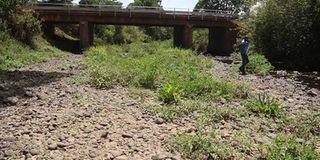Over 30,000 facing starvation in Nyeri as drought bites

A section of River Sagana in Nyeri which has dried up due to the ongoing drought. More than 31,000 people in Nyeri County are in dire need of food aid as the pangs of drought continue to bite in the country. PHOTO | JOSEPH KANYI | NATION MEDIA GROUP
What you need to know:
- Agriculture Executive Robert Thuo said there was poor distribution of rainfall which was not enough to facilitate the germination of seeds.
- Even seeds planted early did not receive enough moisture to allow for germination.
- According to NDMA, the long and short rains were adequate although poorly distributed in both time and space.
More than 31,000 people in Nyeri County are in dire need of food aid as the pangs of drought continue to bite in the country.
According to statistics from the Department of Agriculture, the county is experiencing crop failure for the fourth consecutive year, leaving hundreds of farmers staring at starvation.
Agriculture Executive Robert Thuo said there was poor distribution of rainfall which was not enough to facilitate the germination of seeds.
WILTING
Even seeds planted early did not receive enough moisture to allow for germination, leading to rooting and wilting of seeds and consequent crop failure.
“The rains were erratic and they ceased early at a critical stage of the crops,” noted Mr Thuo.
Lack of certified seeds by farmers, high cost of farm inputs, fall armyworm infestation, millipedes on beans and potato cysts nematode also contributed to poor crop performance.
SH10M BUDGET
In collaborative efforts with the national government and National Drought Management Authority (NDMA), the county has recommended a budget of Sh10 million to manage the situation.
The money is intended for use in conducting soil testing, buy early maturing seeds for the farmers, conduct sensitisation on soil fertility and water harvesting among others.
Kieni, the food basket of Nyeri County, is the most affected constituency.
POORLY DISTRIBUTED
According to NDMA, the long and short rains were adequate although poorly distributed in both time and space to facilitate crop production in the county.
As a result, crops and fodder were lost due to water stress after the rains stopped earlier than expected.
“Farmers have a hard time ahead in the county because both fodder and food production have dropped due to irregular weather patterns occasioned by the effects of climate change,” said Mr Kiragu Kariuki, the county drought coordinator.





